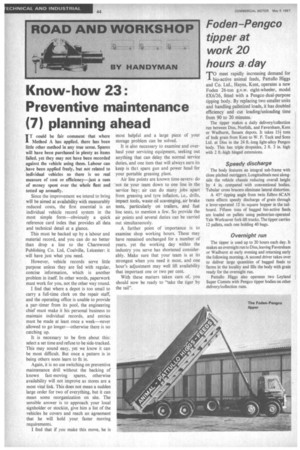Know-how 23: Preventive maintenance (7) planning ahead
Page 46

If you've noticed an error in this article please click here to report it so we can fix it.
IT could be fair comment that where Method A has applied, there has been little other method in any true sense. Spares will have been purchased in plenty as items failed, yet they may not have been recorded against the vehicle using them. Labour can .have been applied freely, but not related to individual vehicles so there is no real measure of cost or efficiency—just a sum of money spent over the whole fleet and totted up annually.
Since the improvement we intend to bring will be aimed at availability with measurably reduced costs, the first essential is an individual vehicle record system in the most simple form—obviously a quick reference card index that provides all data and technical detail at a glance.
This must be backed up by a labour and material record, and you can do no better than drop a line to the Charnwood Publishing Co. Ltd, Coalville, Leicester: it will have just what you need.
However, vehicle records serve little purpose unless they are fed with regular, concise information, which is another problem in itself. In other words, paperwork must work for you, not the other way round.
I find that where a depot is too small to carry a full-time clerk on the repair staff, and the operating office is unable to provide a pan-timer from its pool, the engineering chief must make it his personal business to maintain individual records, and entries must be made at least once a week—never allowed to go longer—otherwise there is no catching up.
It is necessary to be firm about this: select a set time and refuse to be side-tracked. This may sound easy, yet we know it can be most difficult. But once a pattern is in being others soon learn to fit in.
Again, it is no use switching on preventive maintenance drill without the backing of known fast-moving spares, otherwise availability will not improve as stores are a most vital link. This does not mean a sudden large order for two of everything, but it can mean some reorganization on site. The sensible answer is to approach your local signholder or stockist, give him a list of the vehicles he covers and reach an agreement that he will hold your faster Moving requirements.
I find that if you make this move, he is
most helpful and a large piece of your storage problem can be solved.
It is also necessary to examine and overhaul your servicing equipment, seeking out anything that can delay the normal service duties, and one item that will always earn its keep is thzt spare gun and power head for your portable greasing plant.
Air line points are known time-savers: do not tie your team dawn to one line in the service bay; air can do many jobs apart from greasing and tyre inflation, i.e., drills, impact tools, waste oil scavenging, air brake tests, particularly on trailers, and fuel line tests, to mention a few. So provide the air points and several duties can be carried Out simultaneously.
A further point of importance is to examine shop working hours. These may have remained unchanged for a number of years, yet the working day within the industry you serve has shortened considerably. Make sure that your team is at its strongest when you need it most, and one hour's adjustment may well lift availability that important one or two per cent.
With these matters taken care of, you should now be ready to "take the tiger by the tail".




















































































































